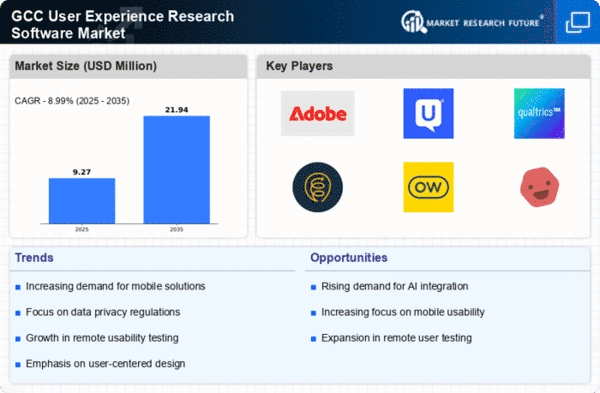Rise of Remote Collaboration Tools
The rise of remote collaboration tools is significantly impacting the user experience-research-software market. In the GCC, the shift towards remote work has necessitated the development of software that facilitates collaboration among teams, regardless of their physical location. This trend is reflected in the increasing adoption of cloud-based research platforms, which allow for real-time collaboration and data sharing. Recent statistics suggest that organizations utilizing remote collaboration tools experience a 25% improvement in project efficiency. As a result, the user experience-research-software market is evolving to incorporate features that support remote teamwork, enabling businesses to conduct research more effectively and efficiently.
Focus on Data Privacy and Compliance
As data privacy regulations become more stringent, the user experience-research-software market is increasingly influenced by the need for compliance. In the GCC, businesses are prioritizing software solutions that ensure user data is handled securely and in accordance with local regulations. This focus on data privacy not only protects consumers but also builds trust, which is essential for long-term customer relationships. The market is expected to see a rise in demand for compliance-focused research tools, with an estimated growth of 10% in this segment. Companies that prioritize data privacy in their user experience research are likely to gain a competitive edge, as consumers become more aware of their rights and the importance of data protection.
Growing Demand for Enhanced User Insights
The user experience-research-software market is witnessing a growing demand for enhanced user insights, driven by the need for businesses to understand customer behavior more deeply. In the GCC region, companies are increasingly investing in software solutions that provide comprehensive analytics and feedback mechanisms. This trend is reflected in the market's projected growth rate of approximately 15% annually, as organizations seek to leverage data-driven decision-making. The ability to gather and analyze user feedback in real-time allows businesses to adapt their strategies swiftly, ensuring they remain competitive. As a result, the user experience-research-software market is becoming a critical component of business operations, enabling firms to tailor their offerings to meet evolving consumer expectations.
Integration of Multichannel Feedback Systems
The integration of multichannel feedback systems is emerging as a pivotal driver in the user experience-research-software market. In the GCC, businesses are increasingly recognizing the importance of collecting user feedback across various platforms, including mobile apps, websites, and social media. This approach not only enhances the quality of insights but also allows for a more holistic understanding of user experiences. Recent data indicates that companies utilizing multichannel feedback systems report a 20% increase in customer satisfaction. Consequently, the user experience-research-software market is adapting to these needs by offering solutions that facilitate seamless integration of feedback from diverse sources, thereby enriching the data pool available for analysis.
Emphasis on Customization and Personalization
The emphasis on customization and personalization is becoming a key driver in the user experience-research-software market. In the GCC, businesses are recognizing the importance of tailoring their research tools to meet specific user needs and preferences. This trend is evident in the increasing demand for software solutions that offer customizable features, allowing organizations to adapt their research methodologies to align with their unique objectives. Data indicates that companies that implement personalized research strategies see a 30% increase in user engagement. Consequently, the user experience-research-software market is responding by providing more flexible and adaptable solutions, ensuring that businesses can effectively capture and analyze user experiences.
















